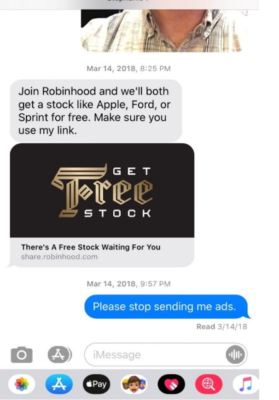Robinhood to seek cell phone account and billing records in spam messages lawsuit
A lawsuit brought by the recipients of unwanted text messages advertising Robinhood continues at the Washington Western District Court. On April 20, 2022, the parties in this case filed a status report with the Court, providing, inter alia, details on their plans for discovery, that is, on information that the plaintiffs and the defendants will seek to obtain to build their evidentiary support.

Let’s recall that the plaintiffs in this case are individuals who got sent messages by their friends under a marketing program devised by Robinhood inviting them to trade with Robinhood. According to the plaintiffs, Robinhood Financial LLC invented the scheme to pay and enable its users to spam their contacts with text message advertisements asking those contacts to “join Robinhood.”
According to the plaintiffs’ complaint, Robinhood has violated the Washington Consumer Electronic Mail Act (“CEMA”) via its refer-a-friend marketing campaign.
The status report, seen by FX News Group, reveals that the plaintiffs intend to conduct discovery on
- Robinhood’s policies and procedures relating to the refer‐a‐friend program at issue in this case;
-
Robinhood’s policies and procedures relating to the referral texts at issue in this case;
-
the computer system/technological platform that Robinhood uses to assist in the transmission of the texts at issue in this case;
-
detailed records available from Robinhood and/or its agents describing the texts at issue in this case and the recipients of the texts, including the date, time, content, sender’s telephone number, recipient’s telephone number, and the residency of text recipients during the class period; and
-
email correspondence between and amongst Robinhood’s employees relating to the refer‐a‐friend program.
To avoid the burden and expense of potentially unnecessary discovery, Robinhood believes that discovery should be stayed until this Court rules on Robinhood’s pending Motion to Dismiss. If discovery proceeds, Robinhood anticipates seeking discovery on all subjects related to its defenses and potential claims against the initiators of referral text messages, including, but not limited to:
- Plaintiffs’ cell phone account and billing records;
- Documents and testimony from Plaintiffs related to Robinhood, including information related to consent;
- Documents and testimony from Plaintiffs relating to the two text messages alleged in the Amended Complaint, including information related to consent;
- Documents and testimony from the individuals who sent the two text messages alleged in the Amended Complaint, including communications between those individuals, Plaintiffs, and Plaintiffs’ counsel;
- Documents and testimony from the individuals who sent the two text messages, alleged in the Amended Complaint, including information related to any business conducted by those individuals and their intentions in sending the messages;
- Documents and testimony related to the relationship between Plaintiffs and the individuals who sent the text messages alleged in the Amended Complaint; and
- The terms of Plaintiffs’ engagement of counsel in this lawsuit and pre‐engagement communications with counsel.
Robinhood has insisted that Robinhood users were solely responsible for deciding whether, when, and to whom to send editable text messages using the native text applications on their personal mobile devices means they cannot plausibly allege that Robinhood provided “substantial assistance” to the Robinhood users who transmitted referral texts to Plaintiffs.





